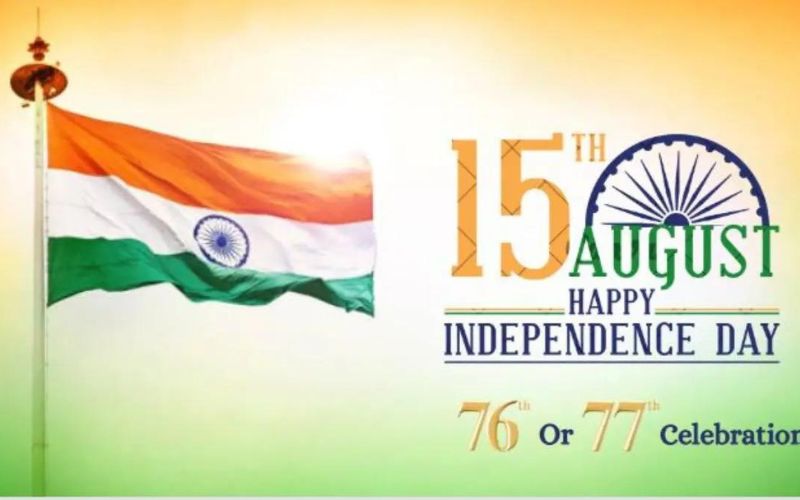On August 15, 2023, India celebrated its 77th Independence Day, marking a significant milestone in the nation’s history. This day commemorates the end of British colonial rule in 1947 and the birth of a sovereign India. Over these 77 years, India has undergone a remarkable transformation, evolving from a newly independent nation grappling with partition and economic challenges to becoming one of the world’s largest and most dynamic democracies. This article reflects on India’s journey over the past seven decades, highlighting key achievements, challenges, and the path forward.
The Dawn of Independence
The Struggle for Freedom
India’s struggle for independence was a prolonged and arduous journey marked by countless sacrifices. The fight against British colonial rule was characterized by both violent and non-violent movements, with leaders like Mahatma Gandhi advocating for non-violent resistance, or Satyagraha, and others like Subhas Chandra Bose taking a more militant approach. The Quit India Movement of 1942 and the Naval Mutiny of 1946 were pivotal moments that intensified the demand for independence.
The Midnight of August 15, 1947
The transfer of power on the midnight of August 15, 1947, was a momentous occasion, symbolizing the end of nearly two centuries of British rule. Jawaharlal Nehru, India’s first Prime Minister, delivered his famous “Tryst with Destiny” speech, expressing the aspirations of a newly independent nation ready to chart its own course.
Post-Independence Challenges
Partition and Its Aftermath
The partition of India in 1947, which led to the creation of Pakistan, was accompanied by unprecedented communal violence, mass migrations, and widespread displacement. The new nation faced the Herculean task of rehabilitating millions of refugees, maintaining law and order, and stabilizing the economy.
Building a Democratic Nation
One of the foremost challenges for India was to establish a robust democratic framework. The adoption of the Indian Constitution on January 26, 1950, laid the foundation for a democratic republic, ensuring fundamental rights and a parliamentary system of governance. The vision of leaders like Dr. B.R. Ambedkar, who played a pivotal role in drafting the Constitution, was instrumental in shaping India’s democratic ethos.
Economic Development and Planning
At the time of independence, India was primarily an agrarian economy with widespread poverty and underdevelopment. The government adopted a mixed economy model, emphasizing both state-led industrialization and private enterprise. The Five-Year Plans, initiated in 1951, aimed at systematic economic development, focusing on sectors like agriculture, industry, and infrastructure.
Milestones in India’s Journey
Green Revolution
The Green Revolution of the 1960s and 70s transformed India’s agricultural landscape, making the country self-sufficient in food production. The introduction of high-yielding varieties of seeds, improved irrigation, and the use of fertilizers and pesticides significantly boosted agricultural productivity.
Economic Liberalization
The economic reforms of 1991 marked a watershed moment in India’s economic history. Facing a severe balance of payments crisis, the government undertook structural reforms, liberalizing the economy, and opening it up to global markets. These reforms led to rapid economic growth, increased foreign investment, and the emergence of a vibrant private sector.
Technological Advancements
India has made significant strides in science and technology over the decades. The space program, spearheaded by the Indian Space Research Organisation (ISRO), has achieved remarkable milestones, including the Mars Orbiter Mission (Mangalyaan) and the Chandrayaan missions to the moon. The information technology (IT) sector has also played a crucial role in driving economic growth, making India a global hub for software services and innovation.
Social Progress
India’s progress in social indicators has been mixed but noteworthy. There have been significant improvements in literacy rates, healthcare, and life expectancy. Landmark legislation like the Right to Education Act and the National Rural Health Mission have contributed to better access to education and healthcare services. However, challenges like poverty, gender inequality, and social discrimination continue to persist.
India’s Role on the Global Stage
A Rising Global Power
India’s economic and strategic importance has grown significantly in recent years. The country’s large and youthful population, burgeoning middle class, and dynamic economy have positioned it as a key player on the global stage. India is a member of several important international organizations and forums, including the United Nations, G20, BRICS, and the World Trade Organization.
Diplomatic Engagements
India’s foreign policy has evolved to reflect its growing global stature. The country has established strategic partnerships with major powers like the United States, Russia, and the European Union, while also strengthening ties with neighboring countries in South Asia. India’s Act East policy aims to enhance economic and strategic relations with Southeast Asian countries, while the Look West policy focuses on engaging with West Asian nations.
Defense and Security
India’s defense capabilities have significantly strengthened over the years. The country has developed a robust defense industrial base, with advancements in indigenous defense technologies and strategic partnerships. India is also an important contributor to international peacekeeping missions and is vital to regional security.
Challenges and the Road Ahead
Economic Inequality
Despite impressive economic growth, India faces significant challenges in addressing economic inequality. Disparities in income and wealth distribution persist, with a substantial portion of the population still living below the poverty line. Bridging this gap requires targeted policies aimed at inclusive growth and social welfare.
Environmental Sustainability
Rapid industrialization and urbanization have led to environmental degradation and resource depletion. Issues like air and water pollution, deforestation, and climate change pose serious threats to India’s sustainability. There is an urgent need for comprehensive environmental policies and the adoption of sustainable practices to mitigate these challenges.
Social Inclusion
India’s diversity is one of its greatest strengths, but it also poses challenges in terms of social inclusion and cohesion. Issues like caste discrimination, gender inequality, and religious intolerance need to be addressed through effective policies and social reforms. Promoting social harmony and ensuring equal opportunities for all citizens is crucial for India’s progress.
Governance and Corruption
Ensuring good governance and tackling corruption remain critical challenges. Strengthening institutions, enhancing transparency, and promoting accountability are essential to build public trust and foster an environment conducive to growth and development.
Education and Skill Development
Investing in education and skill development is vital for India’s future. While significant progress has been made in improving literacy rates and access to education, there is a need to focus on quality education and vocational training to equip the workforce with skills relevant to a rapidly changing global economy.
Conclusion
As India celebrates its 77th Independence Day, it is an opportune moment to reflect on the remarkable journey the nation has undertaken. From the trials and tribulations of partition to becoming a global economic powerhouse, India’s progress has been commendable. The achievements in various fields, be it agriculture, technology, or social development, are a testament to the resilience and determination of the Indian people.
However, the journey is far from over. The challenges of economic inequality, environmental sustainability, social inclusion, and good governance require concerted efforts and visionary leadership. As India looks to the future, it must continue to build on its strengths, address its weaknesses, and strive towards a more equitable, sustainable, and prosperous society.
The spirit of independence and the ideals of justice, liberty, equality, and fraternity enshrined in the Constitution must guide the nation’s path forward. By upholding these values and fostering a sense of unity and collective responsibility, India can continue to achieve new heights and realize the dreams and aspirations of its people.
Happy 77th Independence Day, India! May the journey of progress and development continue, and may the nation shine ever brighter on the global stage.





